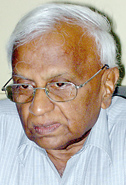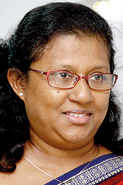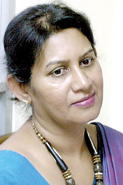News
Entering the world beyond lecture halls
Three young men — vocal, confident, passionate and rational – representing many others. Kasun Silva, (23) from Kottawa, Laksan Yasaratne (25) from Balangoda and Abdul Malik (24) from Slave Island, are talking enthusiastically about “life-changing” experiences.

Prof. T.R. Ariyaratne
Two projects relating to the water crisis faced by many people across the country and the third linked to malnutrition have opened their eyes to the world beyond the lecture halls of the Faculty of Science of the University of Colombo. In a first in Sri Lanka’s university system, these are not merely life-changing experiences, but experiences which have helped them to become “employable” graduates.
With universities grappling with the perennial problem of churning out graduates whom many employers – especially in the private sector – shun, Colombo’s Science Faculty’s answer has been the ‘Service Learning – Science in Action’ module introduced in 2012 by its Career Guidance Unit.
“This is an important programme to increase employability of graduates in the current scenario of an economy mostly based on knowledge,” explains the reticent Dean of the Science Faculty, Senior Professor T.R. Ariyaratne. Reticent he may be but “extremely passionate” he is about the faculty’s career guidance commitment to ensure that his graduates find suitable jobs, says Prof. Preethi Udagama who helped initiate the module last year.
“We are the providers of knowledge and our task is not only the development of intellectual ability but also the enhancement of sub-skills including entrepreneurship and attitudes,” reiterates Prof. Ariyaratne. Delving into science, Prof. Udagama is quick to cite the example of DNA (linked to our genes) being depicted as a double helix, with ‘Service Learning’ being like a triple helix — the university course, the community and the corporate sector. It also enables the corporate sector to study the skills of the undergraduates, while they in turn get a peek into company culture.

Prof. Preethi Udagama
She pays tribute to Chandana Wijayanama who now works in Hong Kong and Prof. Manjula Vithanapathirana of the Department of Educational Psychology of the university’s Faculty of Education for their support.
It is not just community work, the Sunday Times learns. “Community service projects have hiccups. But ‘Service Learning’ has an academic flair. It enhances the soft skills of the undergraduates and allows them to go beyond the syllabus,” says Dr. Deepthi Wickramasinghe who is handling the programme now.
Carried out in the final semester of the degree programme, ‘Service Learning’ blends voluntary community service with academic learning, the Sunday Times understands.
The students participate in organised curricular group projects (in both biological and physical sciences) that address community needs. This helps academic achievement, acquisition of transferable skills required for the world of work and inculcation of a sense of citizenship and social, professional and ethical responsibility. It also gives them the opportunity to participate in outreach and professional development activities, it is learnt.
However, not all students would have the privilege of being part of this programme, for they should have shown their prowess at their studies. “They need to satisfy the degree requirements for the first two years and have a Grade Point Average (GPA) of 2.5 by the end of the fourth semester, says Prof. Udagama.

Dr. Deepthi Wickramasinghe
Explaining that it is an alternative to research projects or internships, she says that a project proposal may be initiated by members of the faculty, corporate sponsors or members of the community. Once a proposal is identified and approved, a project team is put together under a coordinator, who is a member of the faculty. The team will include other academics, representatives of the sponsor, members of the community being serviced and students. Each student in a project is evaluated on job/work assignments, reports, presentations and participation.
The impact of this programme may be measured by the fact that in 2012 there were three such projects, while this year the number has risen to five.
The sparkling gem in the crown that is the ‘Service Learning’ Programme is that those who were part of the 2012 projects have been snapped up by companies and are now holding good jobs.
SLAAS spotlight on ‘Service Learning’
This novel pilot project on ‘Service Learning’ will be the subject of two papers that will be submitted at the 69th annual scientific sessions of the Sri Lanka Association for the Advancement of Science (SLAAS) to be held from December 2-6.
The papers will be on ‘Developing a Service Learning Model: An Effective Educational Tool in Higher Education for Sri Lanka’ and ‘University, Community and Corporate Partnership: A Case Study of Service Learning Projects in the University of Colombo’.
Two water supply projects, one malnutrition programme sponsored by top companies
The water project that Kasun and his seven-member team handled was the second stage of ‘Care for our own’, a corporate social responsibility (CSR) project of Brandix Lanka Pvt. Ltd., to provide drinking for 450 people linked to the company.
Armed with maps, the team visited the homes of the employees across the country, taking meticulous notes and conducting a qualitative study, recalls Kasun, seeing in his mind’s eye the suffering that people had to undergo for lack of water. Some people had to walk more than three kms just to have a bath and then carry back water for cooking and drinking, says Kasun, pointing out that “kelawal athule geval thiyenwa” (some homes are deep within the jungle).
The emotion is tangible when he speaks of a young woman with a three-month-old baby, whom she had to leave alone at home, walk through lonely jungle paths to get to water. “She had been raped twice in broad daylight.” The team suggested the “best possible solutions” which were tube wells, wells or rainwater harvesting which Brandix is implementing for the welfare of its employees.
It was to Nelumwewa, close to the Wilpattu National Park border, with 300 people, in the Puttalam district that Laksan and his team went, for a ‘Drinking water quality improvement’ project of Holcim Lanka Ltd. The people were impoverished, mostly living in cadjan-thatched mud huts.
Here they did have water, but there was heavy kivula (hardness) and it was not drinkable. The team found that the people were forced to buy their water but they just could not afford it. Holcim had built a tank to which the water was channelled through a community-based project from the Mee Oya but the water had impurities. The team suggested that the tank be renovated, with labour from the village itself. “It was a big challenge,” says Laksan, explaining that no men came forward.
“Our team which included girls and the village women did the work in a day,” he says with pride.
Thereafter, the team suggested a filtration system using Moringa Oleifera (murunga) seeds, he says, adding it is cost-effective and sustainable. For Abdul and his team, a ‘Malnutrition Awareness Project’ for GlaxoSmithKline and the Education Ministry, took them to four schools in the Ratmalana-Moratuwa area. They not only evaluated student awareness about malnutrition but also found out the causes affecting such awareness or lack of it and developed a software to calculate and monitor the body-mass index (BMI) of the students.
Following the findings, nutrition experts had held workshops in the schools and also sent charts home to the parents to take measures to improve the nutrition of children who needed it. Kasun speaks for all when he says that the involvement in the projects gave them confidence and experience, which tipped the scales when they faced interviews for jobs.


